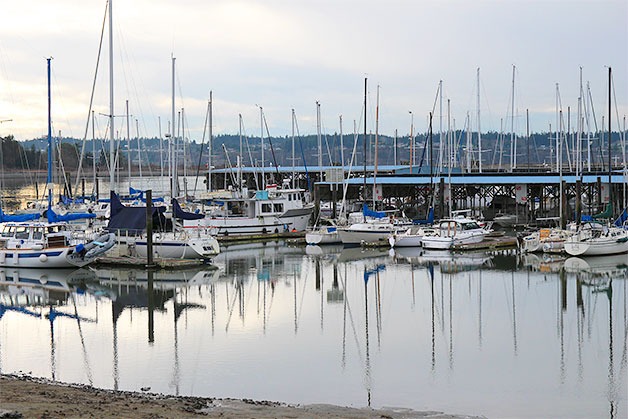The City of Oak Harbor is taking on a giant state bureaucracy in a fight over marinas and money.
State Rep. Dave Hayes, R-Camano, and the City of Des Moines joined the city last week in a showdown in Olympia against the Department of Natural Resources.
Hayes is one of the sponsors of a bill that would allow the city to manage state aquatic lands without paying rent.
Under the bill, the DNR would treat cities and port districts the same in terms of tideland lease fees, which ports do not pay.
It could be a matter of $150,000 a year for the Oak Harbor Marina when a bill that excludes the city from the fee sunsets in four years.
“My concern is that junior taxing districts, mainly cities and ports, should be treated equally,” Hayes said in an interview.
“It’s fundamentally a fairness issue for me.”
Hayes concedes that changing the law is an “uphill battle” during these tight budget times.
Currently, privately owned marinas must pay the DNR tideland lease fees for use of the tidelands. The money goes into the Aquatic Lands Enhancement Account, which funds programs that benefit fish-and-wildlife resources.
Port districts that own marinas get a break from the fees. Cities, however, do not.
Oak Harbor and Des Moines are the only cities that own full-scale marinas in the state, according to Oak Harbor Councilman Rick Almberg.
Oak Harbor had paid about $50,000 a year for the lease fees until former state Sen. Mary Margaret Haugen pushed through a bill exempting Oak Harbor for 10 years. That was six years ago.
Meanwhile, Des Moines has paid about $108,000 a year in tideland lease fees. Chris Sublet, Oak Harbor Marina’s harbormaster, said officials worry that the DNR will charge Oak Harbor about $150,000 a year when the bill expires.
Sublet said that kind of cost will have a big impact on the marina’s budget.
The city’s marina is run as an enterprise fund, which means it doesn’t receive tax dollars.
Sublet, Almberg and the city’s Development Services Director Steve Powers traveled to Olympia last week when House Bill 1306 was on the agenda before the House Environment Committee.
Powers addressed the committee, pointing out that the marina allows access to the water to the public at large, including a free, public boat ramp.
“Our goal is not to profit from the aquatic lands of the state, but to encourage and enhance access to them,” he said.
“Regulating our use of these lands in a manner consistent with that of the port district acknowledges our important role with these waters, recognizes our not-for-profit status and is, frankly, a more equitable approach,” he said.
“Our operation of a marina furthers the state’s goals of maintaining and enhancing the public’s use of the waters of the state,” Powers added.
Des Moines Mayor Dave Kaplan also spoke in support of the bill.
“It is an equity issue,” he said.
On the other side, the DNR and a representative for the recreational boating association argued against the bill.
Megan Duffy, the deputy supervisor for Aquatics, argued that giving cities breaks from the fee would erode funding for important state environmental programs. In fact, she said, the cities that have marinas received more than $2.6 million from the Aquatic Lands Enhancement Account over the years.
Duffy argued giving cities breaks would give them an unfair competitive advantage over for-profit marinas.
Doug Levy, lobbying for the recreational boating association, said his group is concerned that fees will be increased for private marinas if the cities are given a break.
Sublet said the hearing was just one of the many steps that have to be taken before the bill could become law.
While it may not pass this year, he said city officials wanted to get the issue on the radar in Olympia long before they’re expected to start paying again.
“The money the marina makes goes back into the marina,” he said.
“It doesn’t go into someone’s retirement fund.”



